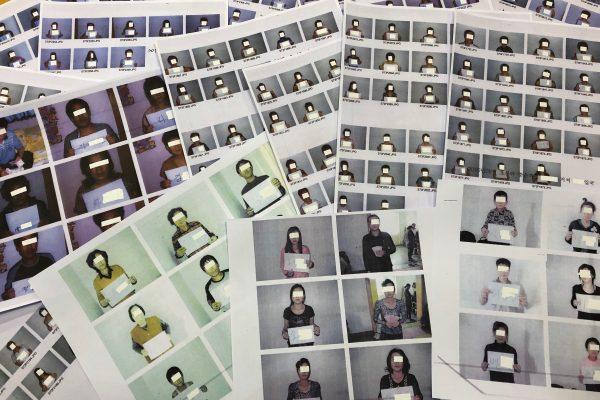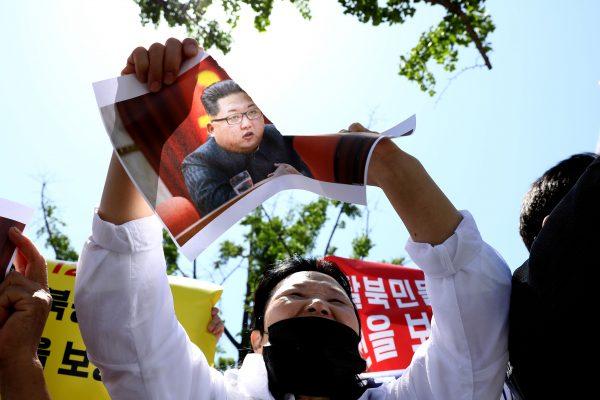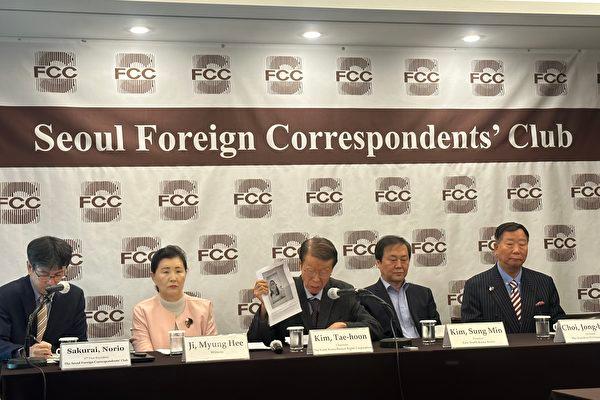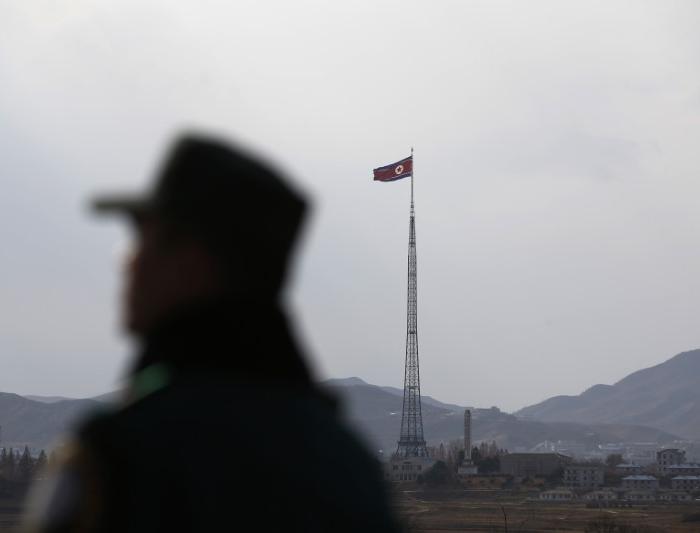Korean human rights defenders have revealed the inhuman treatment meted out by China’s communist regime toward North Korean defectors at a press conference in Seoul, and expressed their grave concern for defectors being forcibly sent back to North Korea—where they are at risk of severe punishment, sexual abuse, and even death.
On Oct. 23, victims of the 2 Communist regimes called upon the international community and the President of South Korea to press Beijing to halt the forced repatriation of North Korean defectors.
Kim Tae-hoon, a lawyer and spokesman on North Korean human rights, told the press conference that a petition letter had been sent to the United Nations General Assembly’s Third Committee—which is currently in session in New York—in response to urgent requests from escapees’ family members.
Speaking about people from North Korea who entered China for economic reasons, Chinese Foreign Ministry spokesperson Wang Wenbin told a press conference on Oct. 12 that “China has always maintained a responsible attitude, and dealt with them properly.”
A Plea From Northeastern China
Kim Sun-hyang, an escapee currently detained along with 350 others at Baishan Detention Center in Jilin Province, northeastern China, sought help through her relatives in China and South Korea.
On Oct. 9, more than 180 of her fellow inmates were forcefully repatriated to North Korea. Fearing that she might face a similar fate, Ms. Kim’s relatives in South Korea submitted a plea to the U.N., as well as to international human rights agencies in South Korea.
The plea stated that the Chinese detention center had refused to accept any food or medicine from relatives of the detainees sent in preparation for their impending repatriation.
Mr. Kim stressed that this is not an isolated case. “This is not solely a concern for Ms. Kim Sun-hyang. Though we cannot provide an exact figure, there are still more than 170 North Korean defectors detained at the Baishan Detention Center where Ms. Kim Sun-hyang is currently held,” he said.
According to Mr. Kim, there are five other detention centers that housed the escapees. “This is a large number, and they are all at risk of being forcibly repatriated,” he said.
Mr. Kim also suggested that the world’s attention is currently fixed on the Israel–Hamas conflict, with the Hamas terrorist organization having taken over 200 Israeli hostages. “But here we’re talking about over 2,000 individuals, with more than 600 of them already forcibly repatriated. This is a significant crime—on par with that of Hamas! Consequently, it is imperative that we vehemently condemn and denounce China’s behavior,” he said.
Nightmares at Chinese Detention Centers
Ji Myung Hee escaped North Korea three times, was deported back to North Korea twice, and finally found her freedom in South Korea in 2016. She told her story of the Chinese detention center at the Oct. 23 Seoul press conference.Ms. Ji’s husband died of an illness in 1996. The regime’s currency reform on November 30, 2009 left her and her two sons in a dire situation. The amount of rice that she could afford to buy annually plummeted from 1,470 kg (3,240 lbs) to only 19 kg (42 lbs) the following year. “I left my children in July 2010, promising to come back to pick them up after I established myself outside, and I fled North Korea for the first time,” said Ms. Ji.
She was arrested by the Chinese police on Oct. 13, 2010. She was deprived of sleep for three days during the interrogation.
At the detention center, she was kept in an isolated cell. There was just one piece of bread for breakfast and dinner, and a bowl of cornmeal porridge for lunch. The police made them do laundry for their wives, she said.
Following approximately a month of detention at the Baishan Detention Center, Ms. Ji was relocated to a Chinese border guard station.
She was there for 70 days, and said she only got to wash her face once in that time. Inside the cell, an old bucket served as the prisoners’ toilet. It was only emptied when it was filled to capacity. “We had just one or two meals a day, and it was leftovers from the soldiers,” she said.
The conditions were so miserable that she made herself sick by swallowing dust and hair she had collected for over a month, hoping to be sent to a hospital where she might find a way to escape.
But the soldiers ignored her stomachache. “The soldiers would come into the cell with electric batons and beat the girls who cried too much,” she said—something that happened often.
After nearly three months of detention in China, Ms. Ji was forcibly deported to North Korea. She described the terrifying situation at the collection center in North Korea.
She recounted that there were no female staff at the center. Without even wearing gloves, the cafeteria workers conducted body cavity searches to check prisoners for contraband, such as hidden money.
The following day, anyone with links to South Korea suffered severe physical torture. “They claimed their hands would hurt if they hit us with their hands, so they put shoes on their hands and struck our faces with it, they hit our arms and legs with sticks ... They were drenched in sweat, their faces and eyes turning red. Even today, I bear the marks of the indentations on my head and legs from those beatings,” said Ms. Ji.
She added, “If we were caught talking in the cell, they would pull us to the iron bars and compel us to open our mouths to receive their spit.”
“Outside the cell window, there was a large tree, and sometimes we could hear the sparrows chirping,“ Ms. Ji said, fighting to hold back tears. ”We felt an overwhelming envy for those sparrows, for their carefree freedom to go wherever they pleased. Inside the cell, there were numerous young girls—Yeongsoon, Eun-kyung, Yeong-ran, Jeong-ae ... They were all apprehended in their desperate pursuit of a means to survive.”

Following her repatriation to North Korea, she overheard during interrogations that there were transactions between China and North Korea. “Allegedly, for every North Korean defector returned by China, North Korea provides China with a quantity of lumber, as they lack the financial means,” added Ms. Ji.
During a grueling 50 days of torture, Ms. Ji maintained that her sole motive was to earn a living in China, with no intention of heading to South Korea. She was sent to Kaechon concentration camp for a 2-year reeducation program, rather than being incarcerated in the political prison—where the punishment would have been even more harsh.
Following these hardships, she determined that she would not tolerate having her children endure life in North Korea any longer. She once again crossed the Yalu River and arrived in South Korea in 2016. In 2019, she bravely risked her life to aid her two sons in escaping from North Korea to China. Today, they have been reunited and live in Seoul.
Ms. Ji said that there are around 35,000 defectors who have found refuge in South Korea, but the number of individuals confined in North Korean political prisons may exceed this figure by many times.
She vehemently denounced Beijing for its inhumane conduct—arresting and forcibly repatriating the many North Korea defectors, while knowing the dire realities they would face back in North Korea.
Defectors’ Determination
Kim Sung Min, a representative of Free North Korea Radio in Seoul, was once a defector who was repatriated by China, only to escape again. He acted in the conference as a co-plaintiff and as a representative appointed by a coalition of 23 North Korean refugee rights organizations.Mr. Kim stressed that “North Korean defectors living abroad are fervently urging China to cease its forced repatriation of them to North Korea. In our pursuit of this objective, we are prepared to take drastic measures to shed light on the grave error of the current policy enforced by the Chinese Communist Party (CCP).”
He listed numerous efforts the groups have tried to stop the CCP from sending refugees back to North Korea, but to no avail—including petitions with millions or tens of millions of signatures, protesting to Chinese embassies abroad, and appealing to Chinese leader Xi Jinping and others.
He said that the defectors are currently preparing for a number of actions.
“We believe the most favorable approach at present is for President Yoon Suk-yeol to strongly urge the Chinese leader to cease the repatriation of North Korean defectors, as they are also South Korean citizens,“ he said. ”Additionally, a group of dozens of defectors is planning to approach the United Nations High Commissioner for Refugees and seek China’s expulsion” from the U.N., he said.
He urged President Yoon to grasp the pressing nature of the current situation and transmit the inquiry to Beijing.
“The defectors will die if they are captured, and they may even face a situation more terrifying than death,“ he said. ”Many defectors told me that in order to prevent their brothers and sisters from suffering, they are willing to do anything to stop the CCP from continuing this inhumane and anti-human exchange with North Korea.”






